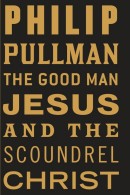A weekly roundup of noteworthy reviews from other sources.
 David Plotz reviews Philip Pullman’s new novel, which reimagines Jesus as twin brothers with different aims: “Now, I applaud Pullman’s humanist beliefs as much as the next agnostic Jew, sympathize with much of his anti-clerical fury, and share his suspicion of organized religions. That said, The Good Man Jesus is often a drag. Weighed down with Christ’s leaden speeches, it is hectoring and obvious where His Dark Materials was subtle and joyful.” He then goes on to say Monty Python’s Life of Brian is a superior treatment of the same subject. . . . Tom Carson reviews a new history of the Battle of Little Bighorn, a dual portrait of Sitting Bull and General Custer, “the horse’s ass we rode in on.” . . . Laura Miller praises Michael Gruber’s new political thriller, The Good Son: “Adeptly plotted yet philosophical, worldly yet preoccupied with moral truth, it’s a book to provoke comparisons with John le Carré and Graham Greene, while at the same time eluding the ideological constraints that weigh so heavy on those masters.” . . . Michelle Goldberg reviews Elaine Tyler May’s new history of the pill, coinciding with its 50th anniversary: “The book covers a lot of ground very quickly; reading it is a bit like being a passenger on a bus tour glancing at the passing landmarks without time to explore any of them. It lacks the depth and richness of May’s superb 1995 history of childlessness in America, Barren in the Promised Land. Still, there are worse things one can say about a book than that it should be longer.” . . . Jincy Willett reviews a novel about “profoundly compartmentalized” people dealing with the aftermath of a suicide. . . . Michael J. Lewis says that a new book about Pop Art “will delight both the friends of Pop and its foes, for the book confirms the prejudices of each group.”
David Plotz reviews Philip Pullman’s new novel, which reimagines Jesus as twin brothers with different aims: “Now, I applaud Pullman’s humanist beliefs as much as the next agnostic Jew, sympathize with much of his anti-clerical fury, and share his suspicion of organized religions. That said, The Good Man Jesus is often a drag. Weighed down with Christ’s leaden speeches, it is hectoring and obvious where His Dark Materials was subtle and joyful.” He then goes on to say Monty Python’s Life of Brian is a superior treatment of the same subject. . . . Tom Carson reviews a new history of the Battle of Little Bighorn, a dual portrait of Sitting Bull and General Custer, “the horse’s ass we rode in on.” . . . Laura Miller praises Michael Gruber’s new political thriller, The Good Son: “Adeptly plotted yet philosophical, worldly yet preoccupied with moral truth, it’s a book to provoke comparisons with John le Carré and Graham Greene, while at the same time eluding the ideological constraints that weigh so heavy on those masters.” . . . Michelle Goldberg reviews Elaine Tyler May’s new history of the pill, coinciding with its 50th anniversary: “The book covers a lot of ground very quickly; reading it is a bit like being a passenger on a bus tour glancing at the passing landmarks without time to explore any of them. It lacks the depth and richness of May’s superb 1995 history of childlessness in America, Barren in the Promised Land. Still, there are worse things one can say about a book than that it should be longer.” . . . Jincy Willett reviews a novel about “profoundly compartmentalized” people dealing with the aftermath of a suicide. . . . Michael J. Lewis says that a new book about Pop Art “will delight both the friends of Pop and its foes, for the book confirms the prejudices of each group.”

